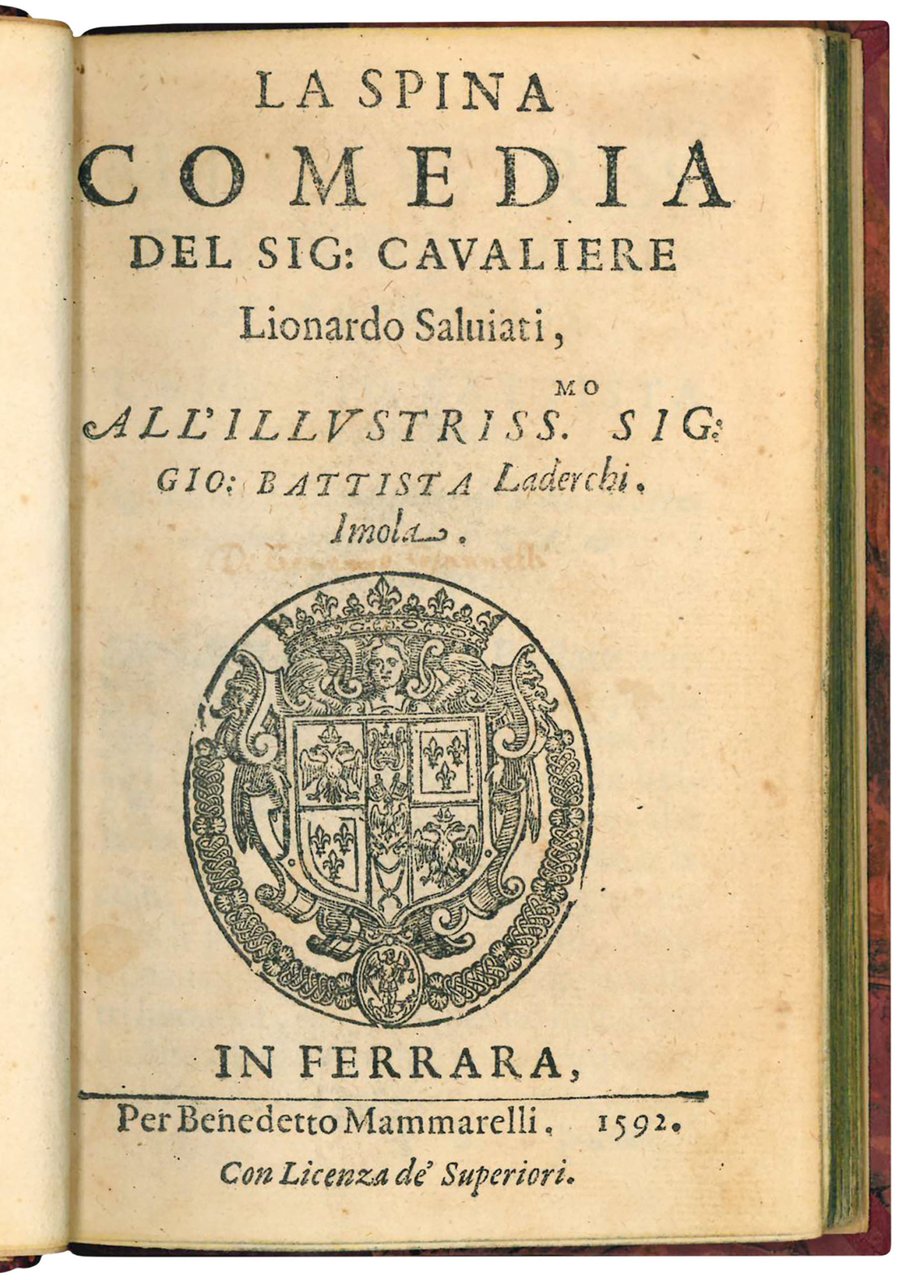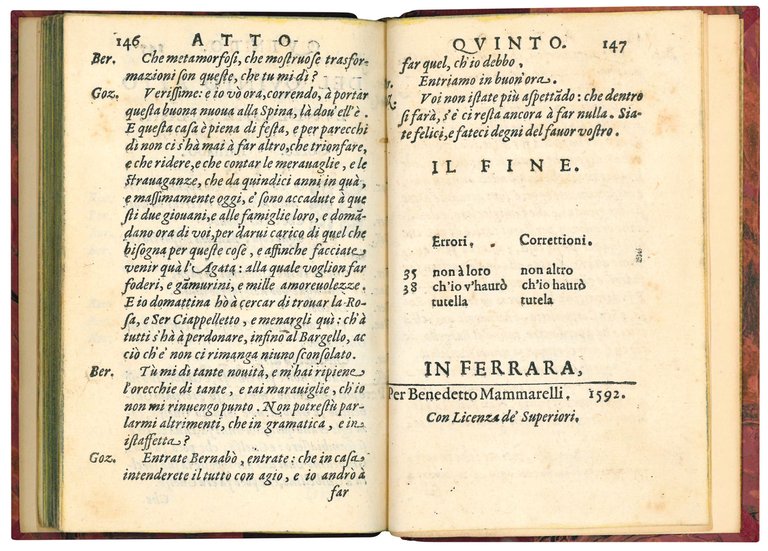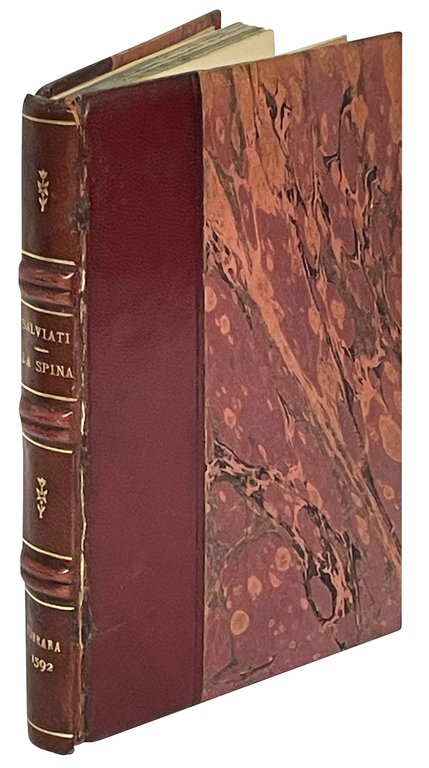


Libri antichi e moderni
SALVIATI, Lionardo (1540-1589)
La spina comedia del Sig: Cavaliere Lionardo Salviati, all'Illustriss.mo Sig: Gio: Battista Laderchi, Imola
Benedetto Mammarello, 1592
1350,00 €
Govi Libreria Antiquaria
(Modena, Italia)
Le corrette spese di spedizione vengono calcolate una volta inserito l’indirizzo di spedizione durante la creazione dell’ordine. A discrezione del Venditore sono disponibili una o più modalità di consegna: Standard, Express, Economy, Ritiro in negozio.
Condizioni di spedizione della Libreria:
Per prodotti con prezzo superiore a 300€ è possibile richiedere un piano rateale a Maremagnum. È possibile effettuare il pagamento con Carta del Docente, 18App, Pubblica Amministrazione.
I tempi di evasione sono stimati in base ai tempi di spedizione della libreria e di consegna da parte del vettore. In caso di fermo doganale, si potrebbero verificare dei ritardi nella consegna. Gli eventuali oneri doganali sono a carico del destinatario.
Clicca per maggiori informazioniMetodi di Pagamento
- PayPal
- Carta di Credito
- Bonifico Bancario
-
-
Scopri come utilizzare
il tuo bonus Carta del Docente -
Scopri come utilizzare
il tuo bonus 18App
Dettagli
Descrizione
First edition, published after the author's death, with a dedication addressed to Giovanni Battista Laderchi from Imola, secretary of state to the Duke of Ferrara, by Giovanni Battista Olgiati (Ferrara, 16 September 1592).
“The two plays of Leonardo Salviati offer good illustrations of pedantic learned comedy in the second half of the century. Grammarian, poet, orator, critic, now chiefly remembered for his linguistic attacks on Tasso's Jerusalem Delivered, Salviati was anxious to follow classical models. His first comedy, Il Granchio (‘The Crab'), which was given a magnificent production at Florence in 1566 [first edition: Florence, 1566], was called a ‘new' comedy but ‘made in imitation of the ancient... not in prose but in verse'. The verse is the unrhymed eleven-syllable line, verso sciolto […] In his next comedy, La Spina, Salviati abandoned verse in favor of prose and thereby gained in realism, but muddied his plot by a silly exchange of identities between two young men who have just returned to Genoa after several years spent in exile. The best features of the play are the departures from classical comedy; i.e. a rascally lawyer named Ciappelletto, borrowed from Boccaccio's Decameron (1.1), and some Genoese constables. Having been tricked by Ciappelletto, the bargello and his minions arrest the wrong people; among others, they arrest a highly respectable old gentleman named Bernarbo as the head of a gang of thieves […] The misdirected zeal of Salviati's bargello is comparable to the officious bungling of Dogberry in Shakespeare's Much Ado About Nothing. The conversation of the Italian captain, although it is often colorful, lacks the homely humor of Dogberry' s prosings, but his actions are more amusing since he is as stupidly aggressive as the English constable is stupidly timid. In the main, however, Salviati belongs among the pedants of the learned comedy” (M.T. Herrick, Italian Comedy in the Renaissance, Urbana & London, 1966, pp. 133-134).
Both Salviati's comedies were published together at Florence in 1606 and again in 1750 in volume 6 of the Teatro comico fiorentino.
Lionardo Salviati was one of the leading figures in the controversy over the Italian language of the sixteenth century. From a distinguished Florentine family, Salviati became consul of the Florentine Academy in 1566 and Knight of the Order of Saint Stephen in 1569. But his fame is mainly linked to the foundation of the Accademia della Crusca (1582-1583) and the Vocabolario of the Italian tongue project. During his lifetime he published an Orazione in lode della fiorentina favella (‘Oration in praise of the Florentine language', 1564) and a commentary on the language of Boccaccio's Decameron (Avvertimenti della lingua sopra ‘l Decamerone, 1584-1586); other works remained manuscripts, such as a grammar (1576-1577), a translation of and commentary on Aristotelian Poetics, a collection of Tuscan proverbs, and his linguistic corrections to Guarini's Pastor Fido (1586) (cf. P.M. Brown, Lionardo Salviati. A critical biography, London-Oxford, 1974).
Edit 16, CNCE35908; L.G. Clubb, Italian Plays (1500-1700) in the Folger Library, Florence, 1968, p. 204, no. 758; M. Bregoli Russo, Renaissance Italian Theater Joseph Regenstein Library of the University of Chicago, Florence, 1984, p. 159, no. 548.

